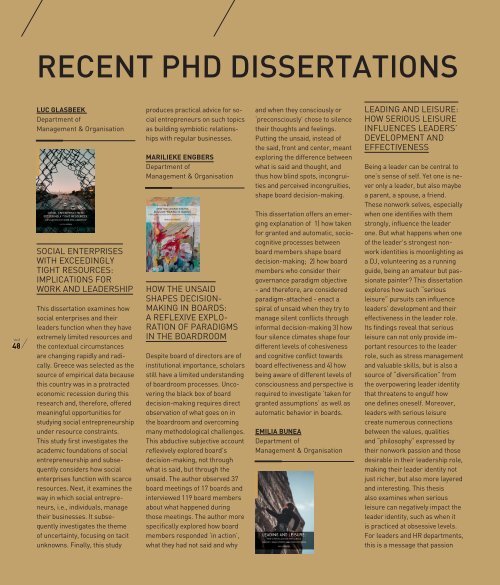Executives in Science, Business and Society 3
You also want an ePaper? Increase the reach of your titles
YUMPU automatically turns print PDFs into web optimized ePapers that Google loves.
RECENT PHD DISSERTATIONS<br />
PAGE<br />
48<br />
LUC GLASBEEK<br />
Department of<br />
Management & Organisation<br />
SOCIAL ENTERPRISES<br />
WITH EXCEEDINGLY<br />
TIGHT RESOURCES:<br />
IMPLICATIONS FOR<br />
WORK AND LEADERSHIP<br />
This dissertation exam<strong>in</strong>es how<br />
social enterprises <strong>and</strong> their<br />
leaders function when they have<br />
extremely limited resources <strong>and</strong><br />
the contextual circumstances<br />
are chang<strong>in</strong>g rapidly <strong>and</strong> radically.<br />
Greece was selected as the<br />
source of empirical data because<br />
this country was <strong>in</strong> a protracted<br />
economic recession dur<strong>in</strong>g this<br />
research <strong>and</strong>, therefore, offered<br />
mean<strong>in</strong>gful opportunities for<br />
study<strong>in</strong>g social entrepreneurship<br />
under resource constra<strong>in</strong>ts.<br />
This study first <strong>in</strong>vestigates the<br />
academic foundations of social<br />
entrepreneurship <strong>and</strong> subsequently<br />
considers how social<br />
enterprises function with scarce<br />
resources. Next, it exam<strong>in</strong>es the<br />
way <strong>in</strong> which social entrepreneurs,<br />
i.e., <strong>in</strong>dividuals, manage<br />
their bus<strong>in</strong>esses. It subsequently<br />
<strong>in</strong>vestigates the theme<br />
of uncerta<strong>in</strong>ty, focus<strong>in</strong>g on tacit<br />
unknowns. F<strong>in</strong>ally, this study<br />
produces practical advice for social<br />
entrepreneurs on such topics<br />
as build<strong>in</strong>g symbiotic relationships<br />
with regular bus<strong>in</strong>esses.<br />
MARILIEKE ENGBERS<br />
Department of<br />
Management & Organisation<br />
HOW THE UNSAID<br />
SHAPES DECISION-<br />
MAKING IN BOARDS:<br />
A REFLEXIVE EXPLO-<br />
RATION OF PARADIGMS<br />
IN THE BOARDROOM<br />
Despite board of directors are of<br />
<strong>in</strong>stitutional importance, scholars<br />
still have a limited underst<strong>and</strong><strong>in</strong>g<br />
of boardroom processes. Uncover<strong>in</strong>g<br />
the black box of board<br />
decision-mak<strong>in</strong>g requires direct<br />
observation of what goes on <strong>in</strong><br />
the boardroom <strong>and</strong> overcom<strong>in</strong>g<br />
many methodological challenges.<br />
This abductive subjective account<br />
reflexively explored board’s<br />
decision-mak<strong>in</strong>g, not through<br />
what is said, but through the<br />
unsaid. The author observed 37<br />
board meet<strong>in</strong>gs of 17 boards <strong>and</strong><br />
<strong>in</strong>terviewed 119 board members<br />
about what happened dur<strong>in</strong>g<br />
those meet<strong>in</strong>gs. The author more<br />
specifically explored how board<br />
members responded ‘<strong>in</strong> action’,<br />
what they had not said <strong>and</strong> why<br />
<strong>and</strong> when they consciously or<br />
‘preconsciously’ chose to silence<br />
their thoughts <strong>and</strong> feel<strong>in</strong>gs.<br />
Putt<strong>in</strong>g the unsaid, <strong>in</strong>stead of<br />
the said, front <strong>and</strong> center, meant<br />
explor<strong>in</strong>g the difference between<br />
what is said <strong>and</strong> thought, <strong>and</strong><br />
thus how bl<strong>in</strong>d spots, <strong>in</strong>congruities<br />
<strong>and</strong> perceived <strong>in</strong>congruities,<br />
shape board decision-mak<strong>in</strong>g.<br />
This dissertation offers an emerg<strong>in</strong>g<br />
explanation of 1) how taken<br />
for granted <strong>and</strong> automatic, sociocognitive<br />
processes between<br />
board members shape board<br />
decision-mak<strong>in</strong>g; 2) how board<br />
members who consider their<br />
governance paradigm objective<br />
- <strong>and</strong> therefore, are considered<br />
paradigm-attached - enact a<br />
spiral of unsaid when they try to<br />
manage silent conflicts through<br />
<strong>in</strong>formal decision-mak<strong>in</strong>g 3) how<br />
four silence climates shape four<br />
different levels of cohesiveness<br />
<strong>and</strong> cognitive conflict towards<br />
board effectiveness <strong>and</strong> 4) how<br />
be<strong>in</strong>g aware of different levels of<br />
consciousness <strong>and</strong> perspective is<br />
required to <strong>in</strong>vestigate ‘taken for<br />
granted assumptions’ as well as<br />
automatic behavior <strong>in</strong> boards.<br />
EMILIA BUNEA<br />
Department of<br />
Management & Organisation<br />
LEADING AND LEISURE:<br />
HOW SERIOUS LEISURE<br />
INFLUENCES LEADERS’<br />
DEVELOPMENT AND<br />
EFFECTIVENESS<br />
Be<strong>in</strong>g a leader can be central to<br />
one’s sense of self. Yet one is never<br />
only a leader, but also maybe<br />
a parent, a spouse, a friend.<br />
These nonwork selves, especially<br />
when one identifies with them<br />
strongly, <strong>in</strong>fluence the leader<br />
one. But what happens when one<br />
of the leader’s strongest nonwork<br />
identities is moonlight<strong>in</strong>g as<br />
a DJ, volunteer<strong>in</strong>g as a runn<strong>in</strong>g<br />
guide, be<strong>in</strong>g an amateur but passionate<br />
pa<strong>in</strong>ter? This dissertation<br />
explores how such “serious<br />
leisure” pursuits can <strong>in</strong>fluence<br />
leaders’ development <strong>and</strong> their<br />
effectiveness <strong>in</strong> the leader role.<br />
Its f<strong>in</strong>d<strong>in</strong>gs reveal that serious<br />
leisure can not only provide important<br />
resources to the leader<br />
role, such as stress management<br />
<strong>and</strong> valuable skills, but is also a<br />
source of “diversification” from<br />
the overpower<strong>in</strong>g leader identity<br />
that threatens to engulf how<br />
one def<strong>in</strong>es oneself. Moreover,<br />
leaders with serious leisure<br />
create numerous connections<br />
between the values, qualities<br />
<strong>and</strong> “philosophy” expressed by<br />
their nonwork passion <strong>and</strong> those<br />
desirable <strong>in</strong> their leadership role,<br />
mak<strong>in</strong>g their leader identity not<br />
just richer, but also more layered<br />
<strong>and</strong> <strong>in</strong>terest<strong>in</strong>g. This thesis<br />
also exam<strong>in</strong>es when serious<br />
leisure can negatively impact the<br />
leader identity, such as when it<br />
is practiced at obsessive levels.<br />
For leaders <strong>and</strong> HR departments,<br />
this is a message that passion

















